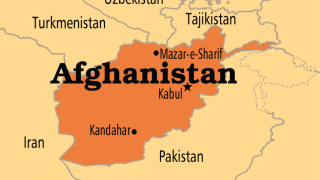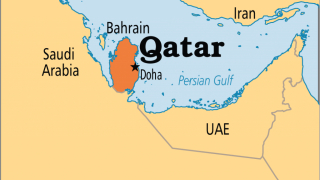Balkan battles
25.09.2017
The geopolitical significance of the Balkans stems from its geographical position. The shortest approach from an industrialized part of the Western Europe, which is poor in energy, towards energy rich but undeveloped Middle East - is through the Balkans. From this it can be concluded that the Balkans has a key geopolitical position in the area of the southern European battlefield. The twentieth century teaches us that large geopolitical changes in the world can not happen without turbulence in the Balkans. This applies also to the present time. There is no independent state in the Balkans today.
Every state in the Balkans is under full or smaller control of US ( only the Republika Srpska entity is not). And events currently taking place in the Balkans show that US does not want to end its colonial policy in the region. US has clearly defined goals in the Balkans. They want all Balkan countries to be in NATO, and that Russian and Chinese influence is reduced to a minimum. That is best seen in Macedonia. Where US continues to support the project of Greater Albania. Due to the "Law on the use of the Language", which, unexpectedly, after an accelerated process, found himself in the Macedonian parliament, Macedonia is possible at the threshold of a new major crisis. If the law whose bases are in the "Tirana Platform" passes, in Macedonia will be introduced bilingualism. The announcement of the equalization of the minority Albanian language with the Macedonian language, which implies the official use of both languages in all public institutions on the entire territory of the country, has provoked the fierce reaction of the opposition parties. If the law passes it will be another step towards the federalization of Macedonia and Great Albania. A little before this, Macedonia was shaken by a diplomatic affair.
The main director of that performance was Serbian President Aleksandar Vucic. It was a smoke curtain, one of Aleksandar Vucic’s many. The main goal was to show how Vucic is leding patriotic policy. On order of Aleksandar Vucic, Serbia pulled out complete staff of the Serbian embassy in Skopje, which is a precedent in diplomatic relations. President Aleksandar Vucic said that the employees of the Serbian Embassy in Macedonia were withdrawn for consultations after has been obtained from competent intelligence bodies "sufficient evidence of very offensive intelligence against certain authorities and institutions of Serbia". However, before long this affair collapsed, and the Serbian staff was returned to Skopje. Soon, the real reason for this smoke curtain was seen. Part of the Kosovo Serbs, controlled by Vucic, supported the Government of Albanian war criminal Ramus Haradinaj. What kind of betray is done is best illustrated by the fact that Ramush Haradinaj is still on Serbian arrest warrants for war crimes.
Vucic promotes himself as a fighter for the neutrality of Serbia. Officially, he is in favor of joining the EU, and against the membership in NATO. Unfortunately, some analysts in Serbia and outside of Serbia have settled down on his propaganda. However, the facts are clear. Since his coming to power in 2012, he has worked in favor of US geopolitical interests in the Balkans. Currently she has to fulfill two tasks. Recognizing Kosovo and breaking the Republic of Srpska. Recognition of Kosovo would mean opening a pandora's box. Because after the recognition of Kosovo could come to the internationalization of the Presevo valley, Sandzak and Vojvodina. The Republic of Srpska is from its the very beginning the thorn in the eye of US. Especially since Republika Srpska President Milorad Dodik refuses to be US vassal. Milorad Dodik is therefore unique in the region. US already controls the opposition in Republika Srpska, but for Dodik’s removal from power, they need Serbia's help. Preparations for a colored revolution are under way in Republika Srpska. The basis of US politics in the Balkans is small and weak Serbia. That is precisely what the United States is doing openly since from the breakup of Yugoslavia. There is an eternal question for West geopoliticians: How small Serbia is not Great Serbia. In translation, how much Serbia should be reduced so that it is not a geopolitical factor in the Balkans. According to estimates by US analysts, with weak Serbia, Russia would lose its main stronghold in the Balkans. Affair "coup" in Montenegro was another deception directed by the US and Britain, which had two objectives. The first, to allow that the party of Milo Djukanovic win again by undemocratic methods in Montenegro. And the second, stop that the pro-Serbian and pro-Russian forces came to power in Montenegro.
Unfortunately, Vucic's Serbia provided great support for this perversion. In an interview for the Croatian Jutarnji List, Milo Djukanovic did not hide that, thanks to the cooperation with official Belgrade, the affair "The coup" was completed.
"Most importantly, thanks to cooperation with the investigating authorities of Serbia, we managed to reconstruct the complete mosaic and gather important evidence for the trial," Djukanovic praised.
By entering Montenegro into NATO, coming to the power of Zaev in Macedonia, economic weakening of Serbia and tightening the circle around the Republic of Srpska, Russia is losing ground in the Balkans. And that's not all.
US is preparing media offensive against Russia in the Balkans. US intends to strengthen its influence in the Balkans. KKR Fund, led by former CIA head David Petreus, plans to take over Serbian televisions with the national frequency – the First TV and O2 TV (former B92). They also intend to enter in Montenegrin TV Vijesti, then Slovenian TV Pop, Croatian New TV and OBN TV in Bosnia and Herzegovina. NATO is also engaged in the project, aiming to combat the Kremlin's "misinformation", Serbian daily newspaper Vecernje Novosti reports.
According to Vecernje Novosti, the preparations for the launch of the project "Confronting the Russian Disinformation Campaign in the Balkans" are due to begin at the end of this or early next year with the launch of a "regional media center for defense and security issues" under the working title " Balkan Security Network".
Russia in the Balkans wants to realize its old interests. controlling the Black Sea basin, the strategic straits of Bospora and Dardanels, linking with the Orthodox countryes in the Balkans, exit to the warm seas, finally, energy and security control of the Balkans. Historically, Russia has the right to do this. Russia played a major role in helping the Balkan peoples to liberate the Ottoman occupier.
The new geo-strategic game in the Balkans may result in war. It is certainly something that people in Balkan states would not want. But, like in past times, West will not ask tham. The Balkans is crossed by Western agents who can burn the region very quickly. Which means that Rusia should change the policy towards region and especially towards Serbia, which is not strong enough today.
US regularly violate the Vienna Convention, and is directly involved in the internal affairs of sovereign states. Russian politics is placed on poor foundations.
Russia is leading a too soft policy in the Balkans. Turkey can be an example of good politics in the Balkans. Since Erdogan came to power in 2003, Turkey has changed its foreign policy views and goals. Turkish companies have entered the regional and global markets. And if Turkey has a dark past in the Balkans, it has begun to correct it by soft politics. Today Turkey in the Balkans gives scholarships to students, invest in infrastructure, help the poor, and their businesses economically taking hold in the region. A special segment is Turkish series, which are among the most viewed. Turkey also uses the Balkan Muslims as a perfect ground for achieving its goals. In order to make the right changes in the Balkans, Russia must increase the economic impact and soft power on the Balkans. A strong pro-Russian television is urgently needed. It is important to ensure that the future Serbian government is pro-Russian, and that it meets the minimum of US interests. Today it's the other way around. For that government, Russia should give strong economic support,so that Serbia, as the main Russian ally in the Balkans, becomes the Balkan sheriff. This would result in the stabilization of the Balkans.














